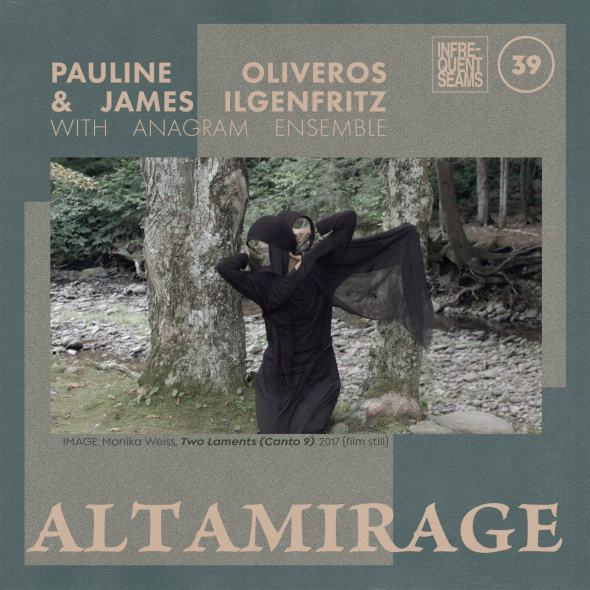Infrequent Seams bringen just einen neuen Longplayer mit Duo-Improvisationen von Pauline Oliveros und dem Kontrabassisten und Komponisten James Ilgenfritz heraus. “Altamirage” enthält neben diesen Aufnahmen, die während der intensiven Freundschaft der beiden in der Zeit von 2007 bis 2016 entstanden sind, auch drei älter Aufnahmen Oliveros’ aus den Jahren um 1960, die ebenfalls von Ilgenfritz’ Anagram Ensemble interpretiert wurden. Gerade in Bezug auf diese älteren Aufnahmen betont Maria Chavez in den Liner notes: “[Oliveros'] written scores could be seen as a durational piece that can live on, for as long as the thought is being shared. So in a way James and his ensemble are participating in a tradition, replaying a past composition in a way it was meant to be heard as learned by the composer themselves. Within this whole album I see many layers; from the personal perspective (illustrating Pauline as an adventurous and edgy young artist, questioning timing and pace during a time where the opposite was supported) to the historical, with an individual who chose to stick to their path regardless of all the pressure around them. In this work there is preservation along with reinvention, with a direct link we will never experience again. So thank you James, for this rare glimpse. It is one that will be studied and cherished for a lifetime”. Das Album erscheint als CD, Tape und zud zum Download.
“Bassist and composer James Ilgenfritz presents a collection of duo improvisations with composer and Deep Listening founder Pauline Oliveros, as well two composed works Oliveros wrote between 1959 and 1961. The duets are a document of Ilgenfritz’s and Oliveros’s friendship and collaboration between 2007 until Oliveros’s passing in 2016, from San Diego, CA to Kingston, NY to Brooklyn, NY. This recording also features Ilgenfritz’s Anagram Ensemble performing two early trio works, which Oliveros recommended Ilgenfritz perform and record. Taken all together, Altamirage continues to solidify Oliveros’ place in the cannon, but also her idiosyncracy, and her spirit of friendship and collaboration –– in this case with Ilgenfritz. Their playing, their collective sense of space is somehow both profoundly avant garde and intimate. It is these things because it is music that could not be made without listening, one to the other, and listening is, in fact, already intimate. In her life, Oliveros wrote a host of exercises for Deep Listening. In one exercise, titled “Collective Environmental Composition,” listening is centered as the primary vehicle for composition itself. Participants find something interesting to listen to and then “each participant” she suggests, “invites the other participants to hear their found listening place.” She goes on to prompt that each paricipant “finds a way to enhance, nullify or otherwise interact” with the sound and eventually to find a way to “connect all the sounds.” It’s a beautiful, wild, and open exercise which is designed for workshops, for mindfulness, for enhancing consciousness. It’s also exactly what Oliveros is doing in her improvisations with Ilgenfritz. And therefore these recordings too are beautiful, wild, and open. Open most of all because they imply that there is more. Nothing closes, everything goes on. ” (Mark Trecka)
